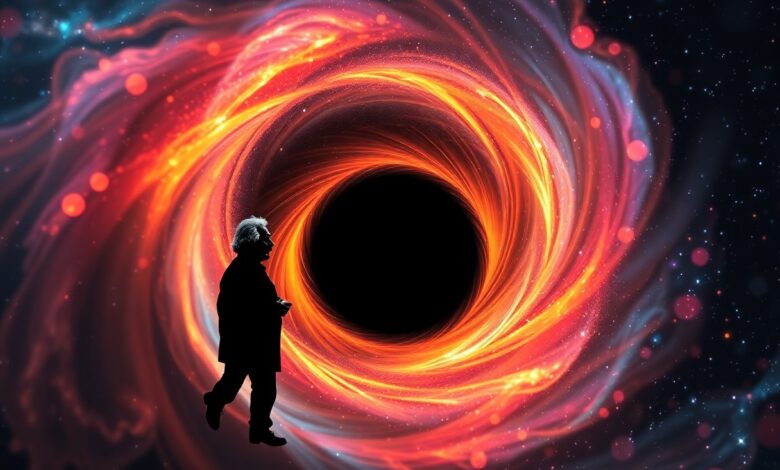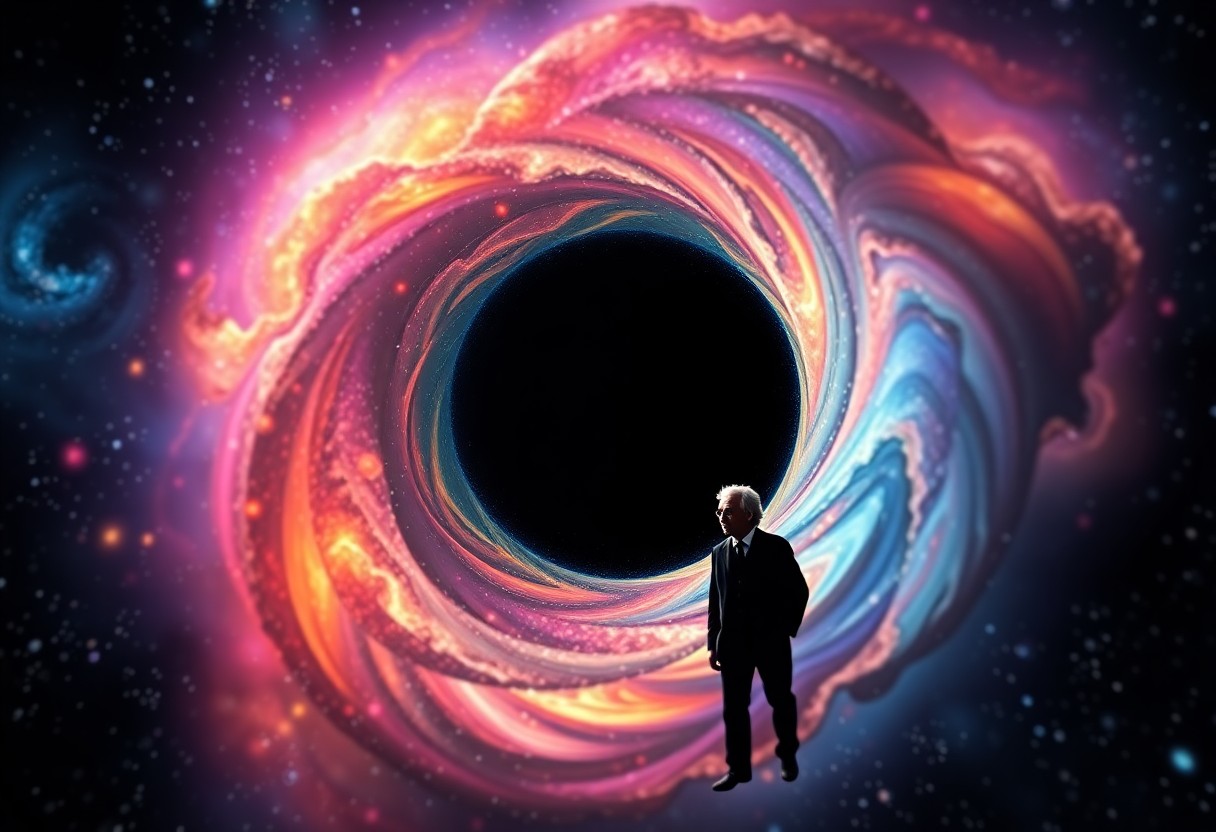Black Hole Paradoxes – When Einstein Meets Quantum Mechanics

Many scientists grapple with the mysteries of black holes, where Einstein’s theories of relativity collide with the strange principles of quantum mechanics. You may find that these perplexing paradoxes challenge your understanding of space, time, and the fundamental workings of the universe. In this exploration, you will uncover how concepts like information loss and Hawking radiation raise profound questions about the nature of reality and your place in the cosmos. Engage with these fascinating ideas to deepen your knowledge of black holes and their implications for modern physics.

Understanding Black Holes
For many, the concept of black holes sparks intrigue and curiosity. These cosmic phenomena represent some of the most extreme conditions in the universe, where gravity is so intense that nothing, not even light, can escape. As you research deeper into your understanding, you’ll encounter fascinating theories and discoveries that challenge our perception of space and time.
The Formation of Black Holes
Along your journey of exploration, you will learn that black holes primarily form when massive stars exhaust their nuclear fuel and undergo a gravitational collapse. This process generates a singularity at the core, surrounded by an event horizon, marking the point of no return for any matter that crosses it.
Types of Black Holes
You can categorize black holes into distinct types based on their mass and formation methods. These include:
- Stellar Black Holes
- Supermassive Black Holes
- Intermediate Black Holes
- Primordial Black Holes
- On the horizon
Assume that each type has unique properties that significantly affect surrounding space and time.
| Type | Description |
|---|---|
| Stellar | Formed from collapsing stars, typically 3-20 solar masses. |
| Supermassive | Located at the centers of galaxies, millions to billions of solar masses. |
| Intermediate | Mass between stellar and supermassive, less understood. |
| Primordial | Formed in the early universe, potentially tiny. |
| On the horizon | Near the event horizon, the boundary for escaping black holes. |
Above you can see how diverse the classifications of black holes are. Each type of black hole holds secrets of the universe, from the highly destructive nature of supermassive black holes to the elusive primordial black holes. Your understanding will deepen as you recognize how these varieties are interconnected with cosmic evolution.
- Formation
- Mass
- Characteristics
- Location
- Research
Assume that by studying these types, you enhance your knowledge of the universe’s larger structures and the fundamental forces at play.
Einstein’s Theory of General Relativity
The theory of general relativity, formulated by Albert Einstein in the early 20th century, revolutionized our understanding of gravity and its relationship with time and space. It posits that massive objects warp the fabric of spacetime, causing smaller objects to follow curved paths when they move nearby. This groundbreaking concept not only challenged classical physics but also laid the foundation for modern cosmology and the study of black holes.
Key Principles of General Relativity
Among the core principles of general relativity is the idea that gravity is not merely a force acting at a distance but instead a manifestation of spacetime curvature. This means that objects, like planets and stars, create a “dimple” in spacetime, which influences the motion of other nearby objects. You’ll find this perspective fundamentally changes how you perceive gravity as an intrinsic part of the universe’s geometry.
Black Holes in the Context of General Relativity
Holes emerge as one of the most compelling predictions of general relativity, revealing regions in spacetime where gravity becomes so strong that nothing, not even light, can escape their grasp. When a massive star collapses under its own weight, it can create a singularity, an infinitely dense point at the core of a black hole surrounded by the event horizon. Here, the known laws of physics break down, prompting your curiosity about what lies beyond this mysterious boundary.
A black hole represents a profound intersection of general relativity and your understanding of the universe. As mass compresses into an infinitely small volume, it produces extreme gravitational effects that warps spacetime drastically. Inside the event horizon, all paths lead to the singularity, making escape impossible. This characteristic not only fuels your fascination with black holes but raises pivotal questions about the nature of reality and the fate of objects that venture too close, showcasing the extraordinary phenomena predicted by Einstein’s groundbreaking theory.
Quantum Mechanics Fundamentals
One of the most fascinating realms of modern physics is quantum mechanics, where the traditional laws of physics encounter perplexing phenomena. This domain fundamentally challenges our understanding of reality, introducing principles that dictate how matter and energy interact at the smallest scales, far removed from our everyday experiences. Here, you’ll discover how particles behave in ways that defy classical logic, shaping the foundation of the universe you inhabit.
Core Concepts of Quantum Mechanics
Across this enigmatic landscape, several core concepts emerge, including wave-particle duality, uncertainty principles, and superposition. These principles reveal that particles can exist in multiple states simultaneously and that their behaviors are inherently probabilistic, rather than deterministic. This depth of complexity invites you to rethink the nature of reality and challenges your intuitions about how the universe operates.
Quantum Behavior of Particles
Around the quantum level, particles exhibit astonishing behavior that differs vastly from classical expectations. This behavior is characterized by principles such as superposition, where particles exist in multiple states at once, and entanglement, where particles become interconnected in ways that transcend space. These phenomena imply the universe operates on unpredictable odds rather than fixed certainties, adding layers of intrigue and challenge to your understanding of physical laws.
Another vital aspect of quantum behavior is the phenomenon of quantum entanglement, where particles become linked regardless of the distance separating them. This means a change to one particle can instantaneously affect its counterpart, leading to implications for communication and information transfer across vast distances. Moreover, the superposition concept suggests that you can influence existence itself – a particle can be here and there at once until observed. These ideas not only reshape your understanding of reality but also reveal potential applications in areas such as quantum computing and cryptography, propelling your curiosity deeper into the quantum realm.
The Information Paradox
All physicists are intrigued by the information paradox, a perplexing dilemma arising from the nature of black holes. According to quantum mechanics, information cannot be destroyed, yet when matter falls into a black hole, it seems to vanish. This contradiction challenges our understanding of fundamental physics, raising profound questions about entropy, the conservation of information, and the very fabric of reality itself.
What is the Information Paradox?
Any time you contemplate the fate of matter and information swallowed by a black hole, you encounter the information paradox. Black holes, according to general relativity, seem to obliterate all information. However, quantum mechanics asserts that this information must persist somehow, leading to a clash of principles that remains unresolved in contemporary physics.
Proposed Resolutions to the Paradox
Along the quest for understanding, scientists have proposed several resolutions to the information paradox. Suggestions range from the idea that information is stored in subtle correlations on the event horizon, to the radical notion that black holes might emit information through Hawking radiation, allowing it to escape and be preserved. Each theory continues to spark heated debate among experts.
Due to the complex nature of the resolutions, one approach suggests that information may escape during the black hole’s evaporation phase through Hawking radiation, potentially retaining a record of what was consumed. Another intriguing concept is the holographic principle, which posits that all information is encoded on a two-dimensional surface, implying that even in a black hole, information might be preserved in a different form. These ideas not only challenge traditional views on gravity and information but also point towards deeper connections between quantum mechanics and gravity, paving the way for future breakthroughs in fundamental physics.
Hawking Radiation
Many scientists consider Hawking radiation as one of the most groundbreaking predictions in theoretical physics since it bridges the gap between quantum mechanics and general relativity. Formulated by physicist Stephen Hawking in 1974, it proposes that black holes are not entirely black but can emit radiation due to quantum effects near their event horizons. This phenomenon challenges our understanding of black holes, suggesting they can lose mass and ultimately evaporate over time, leading to profound implications for both black hole physics and cosmology.
Concept and Implications of Hawking Radiation
Across the world of physics, Hawking radiation has spurred a new wave of inquiry into the nature of black holes. It introduces the idea that particles can escape the gravitational pull of a black hole when they are formed at the event horizon. The implications are vast: if black holes can emit radiation and gradually lose mass, they may not be as eternal as previously thought. This fundamentally alters how you might perceive the lifecycle of a black hole in the universe.
Hawking Radiation and the Fate of Black Holes
Below this fascinating concept lies the chilling notion that all black holes may eventually shrink and disappear completely. As they emit Hawking radiation, they lose energy and mass, leading to their evaporation over incredibly long timescales. Hence, the fate of black holes raises necessary questions about the preservation of information and the ultimate fate of the universe. While the exact timeframe for a black hole’s demise can stretch beyond your current cosmic imagination, understanding Hawking radiation invites you to reconsider the permanence of these massive cosmic entities and their role in the evolution of the cosmos.
The Firewall Paradox
To navigate the intriguing world of black holes, you must consider the Firewall Paradox, which emerges from the clash between Einstein’s theory of general relativity and quantum mechanics. This paradox suggests that a barrier, or “firewall,” exists at the event horizon, incinerating anything that attempts to cross it. The implications of this hypothesis challenge the conventional understanding of black hole behavior and the nature of spacetime itself.
Understanding the Firewall Hypothesis
With the Firewall Hypothesis, you are presented with a scenario where quantum mechanics implies that an observer falling into a black hole would encounter a highly energetic barrier at the event horizon. This barrier theoretically annihilates information, forcing you to question the fundamental principles of physics, such as the conservation of information.
Implications for Black Hole Research
Below the surface of theoretical physics, the Firewall Hypothesis signals a dramatic shift in your understanding of black holes. If correct, it necessitates a re-evaluation of established theories, sparking discussions on information loss and the fundamental fabric of reality.
The Firewall Hypothesis could redefine your perspective on black holes and their role in the universe. As researchers investigate this paradox, they face the potential for a profound reassessment of the nature of spacetime and gravity. The theory also raises significant questions about how information is preserved in the universe, as your conception of reality might hinge on revelations that challenge traditional views. This ongoing research signals an exciting yet uncertain future in black hole physics, urging you to reconsider your understanding of one of nature’s most enigmatic phenomena.
To wrap up
Hence, as you explore the fascinating interplay between Einstein’s theories and quantum mechanics surrounding black hole paradoxes, you gain insight into the complexities of the universe. These paradoxes challenge your understanding of reality, pushing the boundaries of scientific inquiry and encouraging you to think critically about fundamental principles. By grappling with concepts like information loss and the nature of space and time, you deepen your appreciation for the mysterious yet profound workings of our cosmos.
Discover more from GTFyi.com
Subscribe to get the latest posts sent to your email.



